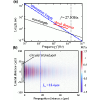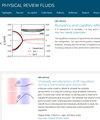Eckart streaming with nonlinear high-order harmonics: An example at gigahertz
IF 2.5
3区 物理与天体物理
Q2 PHYSICS, FLUIDS & PLASMAS
引用次数: 0
Abstract
Acoustic streaming shows great potential in applications such as bubble dynamics, cell aggregation, and nanosized particle isolation in the biomedical and drug industries. As the acoustic shock distance decreases with the increase of incident frequency, the nonlinear propagation effect will play a role in acoustic streaming, e.g., Eckart (bulk) streaming at a few gigahertz. However, the theory of source terms of bulk streaming is still missing at this stage when high-order acoustic harmonics play a role. In this paper, we derive the source term including the contribution of high-order harmonics. The streaming-induced hydrodynamic flow is assumed to be incompressible and no shock wave occurs during the nonlinear acoustic propagation as restricted by the traditional Goldberg number or , which indicates the importance of nonlinearity relative to dissipation. The derived force terms allow evaluating bulk streaming with high-order harmonics at gigahertz and provide an exact expression compared to the existing empirical formulas. Numerical results show that the contribution of higher-order harmonics increases the streaming flow velocity by more than . Our approach clearly demonstrates the errors inherent in the expression introduced by Nyborg which should be avoided in numerical computations as it includes part of the acoustic radiation force that does not lead to acoustic streaming.

带有非线性高阶谐波的埃卡特流:千兆赫实例
声流在生物医学和制药行业的气泡动力学、细胞聚集和纳米颗粒分离等应用中显示出巨大的潜力。随着入射频率的增加,声波冲击距离减小,非线性传播效应将在声波流中发挥作用,例如几千兆赫的埃卡特(体)流。然而,当高阶声谐波起作用时,现阶段还缺少体流的源项理论。本文推导了包括高阶谐波贡献在内的源项。假定流体动力流不可压缩,并且在非线性声波传播过程中不会出现冲击波,如传统的戈德堡数Γ<1 或Γ≈1 所限,这表明了非线性相对于耗散的重要性。推导出的力项允许在千兆赫兹频率下评估具有高阶谐波的体流,并提供了与现有经验公式相比的精确表达式。数值结果表明,高阶谐波的贡献使流流速增加了 20% 以上。我们的方法清楚地表明了尼伯格引入的表达式中固有的误差,在数值计算中应避免这种误差,因为它包含了部分不会导致声流的声辐射力。
本文章由计算机程序翻译,如有差异,请以英文原文为准。
求助全文
约1分钟内获得全文
求助全文
来源期刊

Physical Review Fluids
Chemical Engineering-Fluid Flow and Transfer Processes
CiteScore
5.10
自引率
11.10%
发文量
488
期刊介绍:
Physical Review Fluids is APS’s newest online-only journal dedicated to publishing innovative research that will significantly advance the fundamental understanding of fluid dynamics. Physical Review Fluids expands the scope of the APS journals to include additional areas of fluid dynamics research, complements the existing Physical Review collection, and maintains the same quality and reputation that authors and subscribers expect from APS. The journal is published with the endorsement of the APS Division of Fluid Dynamics.
 求助内容:
求助内容: 应助结果提醒方式:
应助结果提醒方式:


